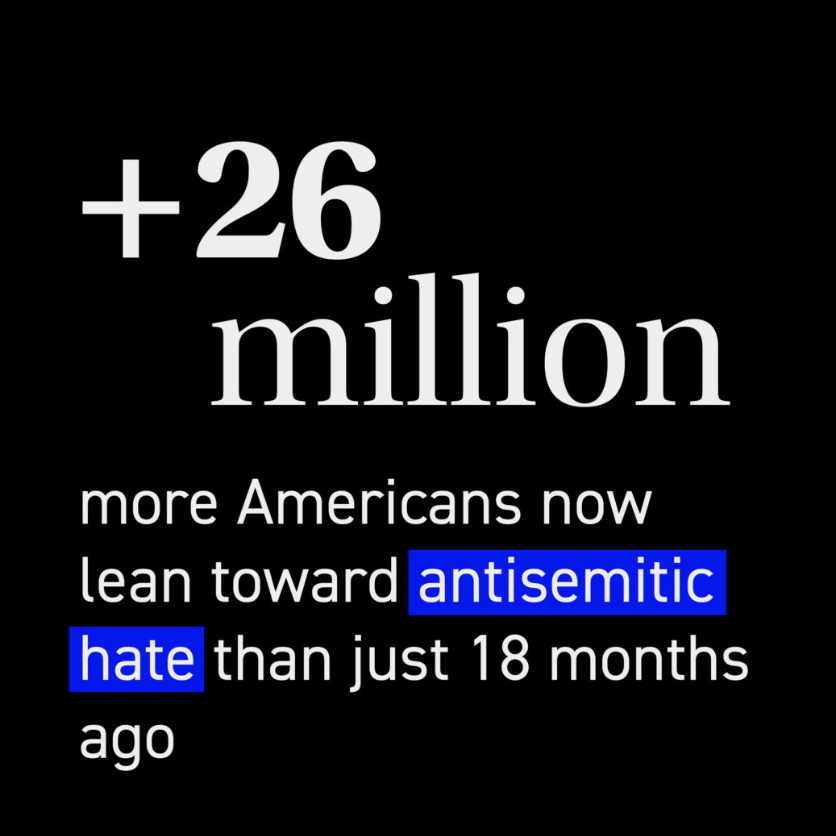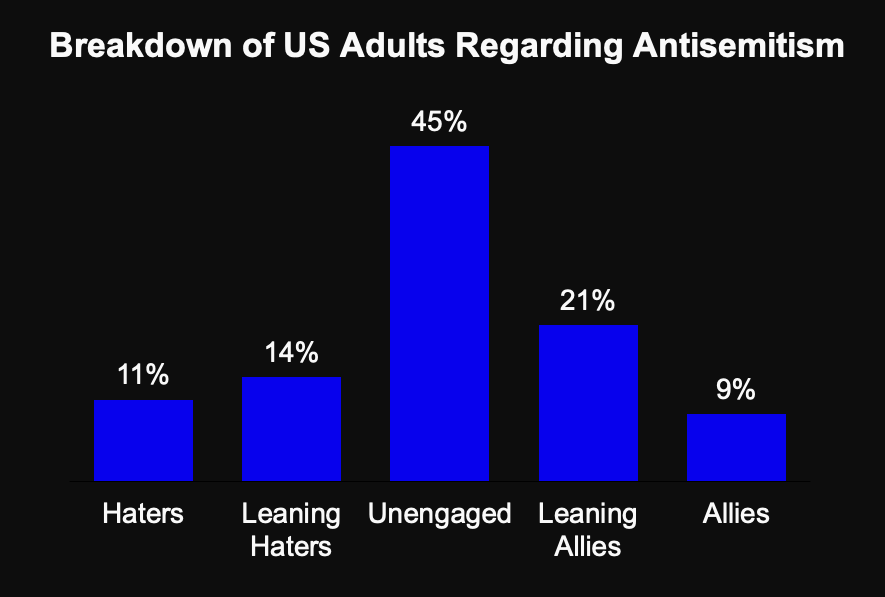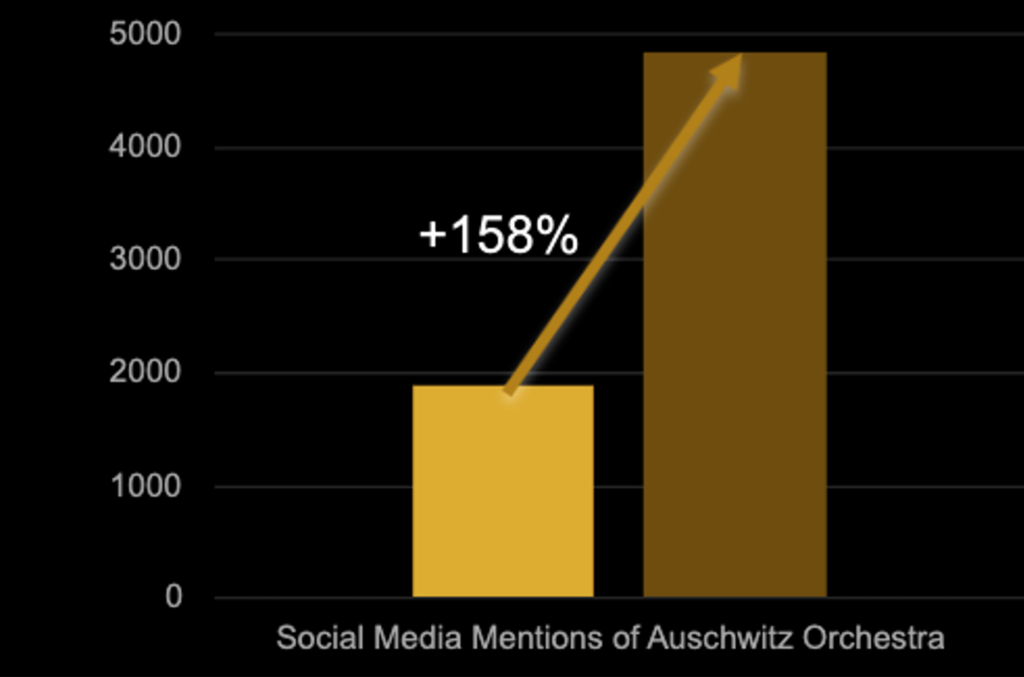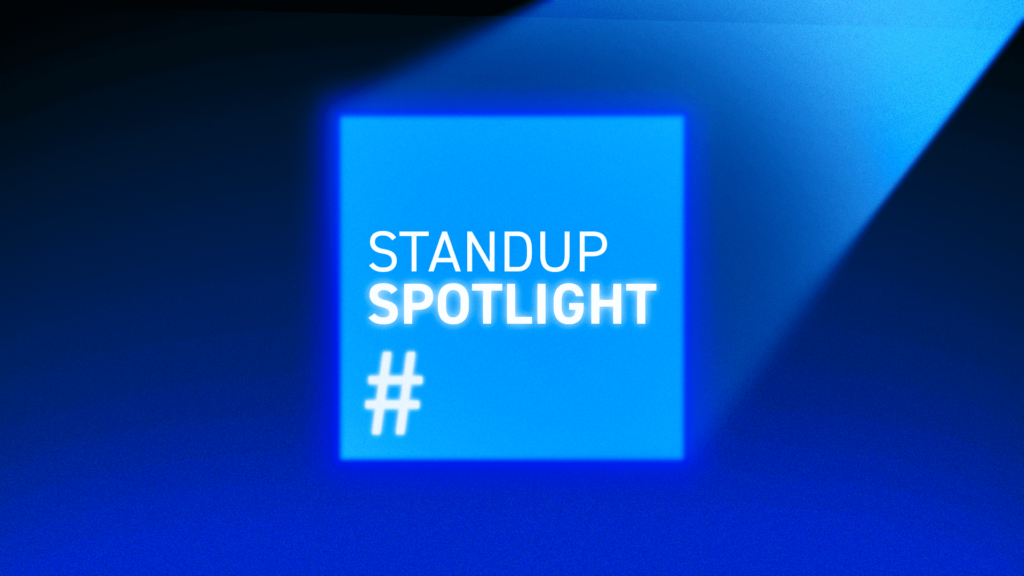In a time of rising antisemitism, nearly half of US adults remain unengaged on the topic—less aware of Jewish hate around them, uninformed or misinformed about its scale and impact, and less likely to stand up on behalf of Jews experiencing it. That’s the core finding of “Stand Up to Jewish Hate: The US Antisemitism Landscape Survey,” FCAS’ semiannual survey of 8,000 Americans that tracks attitudes toward Jews and antisemitism.
Central to this research is our unique segmentation of American adults based on their attitudes about:
- Jewish people (e.g., do Jews cause problems, are they a threat)
- Jewish tropes/stereotypes (e.g., Jews are penny pinchers, run the media, are more loyal to Israel than to the US)
- Antisemitism/prejudice against Jewish people in the US (e.g., is it a major issue, blown out of proportion)
Through a battery of attitudinal questions on these topics, we classify individuals into the five categories listed below:
Since our June 2023 survey, before October 7 and the ensuing Israel-Hamas war, the number of Americans who are Unengaged on this topic is largely unchanged. But that fact masks a significant shift toward hate. Many Americans have moved one step toward hate, with the Unengaged category gaining some former Leaning Allies and losing people to Leaning Haters.
Haters and Leaning Haters combined have grown from 15% to 25% of US adults in just 18 months—that translates into 26 million additional Americans moving from Allies or Unengaged into hate. Meanwhile, Allies and Leaning Allies have decreased by 28 million US adults in the same 18 months.
The December 2024 survey showed slight signs of improvement as the negative trends slowed, but the levels of antisemitic beliefs are profoundly higher than in 2023. This shift quantifies the Jewish hate that has been visible in so many people’s lives—in private conversations, social media, lived experiences, and real-world incidents.

The trend toward Jewish hate is visible across all attitudinal drivers
This alarming and rapid shift is driven by multiple categories of belief moving in tandem. Overt antisemitism is on the rise, and so is the often-unconscious bias manifested in harmful Jewish tropes. In addition, skepticism about the seriousness of antisemitism is worsening.
The first driver is a significant rise in overt antisemitism. 20% of US adults somewhat or strongly agree that Jews are a threat to the unity of American society—up from 12% in June 2023. Year-on-year, Jewish people and Hispanic people are the fastest-growing perceived threats compared to other groups defined by race, ethnicity, gender, or religion. In addition, 31% of Americans believe that Jewish people cause problems in the world—up from 19% just 18 months earlier. These increases in overt antisemitic beliefs are visible across ages and race/ethnicity, revealing how recent events have changed the cultural landscape and given permission for antisemitic attitudes to flourish.
Harmful Jewish tropes have also gained ground in the US. Belief has grown in every anti-Jewish stereotype that our survey tracks, for example:
- 58% of Americans think it’s at least somewhat true that Jewish people are thrifty and cost-conscious
- 55% believe American Jews care more about the future of Israel than the future of their own country
- 54% think of Jews as white and wealthy
- 44% think Jews run Hollywood and 42% believe Jews run media in America
As beliefs in tropes worsen, more Americans reduce Jewish people to oversimplified labels, making it easier to misunderstand, fear, hate, or “other” them in ways that lead to more overt antisemitic attitudes and behaviors.
Finally, skepticism about antisemitism has also increased. 62% of US adults believe prejudice against Jews is a minor problem or not a problem at all. 36% think that issues of antisemitism in the US are blown out of proportion—up from 28% in June 2023. And 47% of Americans believe Jewish people can handle antisemitism on their own—up from 40%.
Contributing to all these beliefs is how Americans are responding to recent external forces:
- The complexity and controversy around the Israel-Hamas war are encouraging many Americans to conflate negative feelings about Israel’s actions with negative feelings about Jews in general. Only 34% of Americans have a somewhat or very positive perception of the Israeli government. 30% feel positively about Israel’s handling of the war. Surrounded by controversy and strong opinions, some Americans choose not to get involved, not just in the war but in antisemitism as well.
- Propaganda is breaking through. For example, terms such as “Zionists” are being hijacked and leading many Americans to have negative associations with not only those who support Israel, but any Jewish person. When asked if calling someone a Zionist is a positive, neutral, or negative label, most Americans are neutral or don’t have an opinion, but among those who do, negative associations far outweigh positive associations.
- The history of antisemitism is increasingly forgotten and not taught. 45% of US adults don’t believe Jews have experienced systemic prejudice and institutional inequality across the history of the US. The majority of Americans don’t know about 20th century university quotas on how many Jews could be admitted or about Jews being barred from practicing medicine and law. To many Americans, prejudice against Jews ended with the Holocaust and isn’t relevant or serious today.
- Most Americans believe all forms of prejudice are on the rise, and compared to other forms of hate, Jewish hate simply isn’t as important to them. 66% think it’s more acceptable to express prejudiced opinions in America recently, and 68% don’t think prejudice will improve following the recent change in US political leadership. As a result, many people are focusing more on the hate they see affecting themselves and their loved ones. In comparison to other forms of hate, antisemitism drops lower in importance for them.
The latest findings provide room for optimism
The trends since 2023 are bleak, but there are early signs of the negative trends stopping or even reversing slightly. The most recent December 2024 survey showed that Haters and Leaning Haters are no longer continuing to grow. The number of people who think Jews are a threat or cause problems didn’t continue to worsen. Allies and Leaning Allies, declining in earlier surveys by multiple percentage points every six months, actually increased slightly in December—each group grew one percentage point.
However, these signs of improvement are very small in the context of the larger negative shifts since 2023. More people than ever believe antisemitism is not a problem at all and that Jews can handle in on their own. Beliefs in several harmful Jewish tropes improved slightly in the most recent survey but are still at very high levels. We have a long way to go. The slowing of some negative trends is a good sign, but time will tell if this is the beginning of a major turnaround or if this latest distribution of Allies, Unengaged, and Haters is the new “normal.”
Younger Americans are more likely to lean into antisemitism
While many trends around antisemitic attitudes cross age cohorts, there are notable differences. On average, 18-29-year-olds are less likely to be Allies and more likely to be Haters. That’s been getting worse over time until the slight improvement seen in the December 2024 survey. 30-49-year-olds follow a similar pattern.
Younger Americans are less likely to be Allies for all the same reasons examined earlier:
- Younger adults are more likely to have overt antisemitic beliefs (e.g., 40% say Jews cause problems in the world).
- They are more likely to believe in various harmful Jewish tropes.
- They are more likely to be skeptical about antisemitism (e.g., 44% think it’s blown out of proportion).
The influencing beliefs discussed earlier apply to younger Americans to an even greater degree. Younger Americans feel even more negatively about Israel’s actions in the war and about “Zionists.” They are less aware of the history and scale of anti-Jewish prejudice in the US and more tuned to other forms of hate rather than Jewish hate.
Unengaged Americans: The challenge and the opportunity
Despite the negative trends, almost half of Americans are still Unengaged on these issues—uninformed or misinformed bystanders who are reachable and persuadable. Reversing these trends requires a focus on this large opportunity, and through this research we know a great deal about what Unengaged Americans believe, what the drivers are behind those beliefs, and what is needed to move them on a journey from Unengaged to Allies.
First, Unengaged Americans are fundamentally less aware of everything related to Jewish people and antisemitism. 42% don’t know any Jews, and for those that do, it’s more likely acquaintances. Only 29% say they have ever heard someone they know say something prejudiced about Jews—almost twice as many have heard something prejudiced against Black people. So it’s no surprise that only 13% are very familiar with recent events regarding anti-Jewish prejudice. It’s simply not part of their world.
With so little firsthand experiences with these issues among Unengaged, misinformation often fills the vacuum. Almost two-thirds of Unengaged are activated on other forms of prejudice but simply don’t think of anti-Jewish prejudice the same way. Half of US adults believe Jews are a large and influential portion of the US population and simply don’t need help. Thus, Unengaged adults are far more likely to think of issues such as racism as far more important. In addition, there is little societal pressure to take on Jewish hate. Only 29% of Unengaged Americans think others will disapprove of them if they don’t stand up for Jews experiencing antisemitism. There is cultural permission to ignore it.
Finally, Unengaged Americans think they couldn’t make a difference even if they believed in the reality and importance of antisemitism. One-third believe there’s nothing at all they can do to counteract prejudice against Jews, and many others feel they could make little impact.
For a more comprehensive look at what our research tells us about what works to engage with Unengaged Americans, see our companion report.
Any efforts to change the hearts and minds of Unengaged Americans must be grounded in these challenges. Skipping a step on the journey toward allyship risks losing them to the hate that surrounds them. We must show them Jewish hate is real. We must show them it’s important to fight it just like other forms of hate. We must show them that individuals like them can make a difference. And we must show them how.
FCAS’ campaign is entirely driven by these findings, and we see the results consistently. Unengaged people who saw any FCAS ad are 42% more likely to be familiar with recent antisemitic events compared to those who don’t recall our ads. They are 32% more likely to strongly agree that antisemitism is an issue today. And they are 46% more likely to stand up for Jews experiencing it.
When the headwinds giving antisemitism more strength seem overwhelming, we believe it’s more important than ever to focus on the movable target of Unengaged Americans, ground our work in data on what works with them, and double-down on the messaging that shows results.
Methodology
| “Stand Up to Jewish Hate: The US Antisemitism Landscape Survey” is semiannual research on Americans 18 and older conducted by the Foundation to Combat Antisemitism and VML. This ongoing study tracks Americans’ attitudes and actions around antisemitism in the context of recent events. The latest survey, fielded Dec 2024 – Jan 2025, used a nationally representative sample of 8,000 US adults plus an augment of 600 respondents for demographic analysis, weighted to match the US population. Participants are classified into segments (e.g., Allies) based on a weighted scoring methodology applied to a set of attitudinal questions about Jewish people and about antisemitism. The survey was conducted online and has a margin of error of ±0.92%. |
About FCAS
The Foundation to Combat Antisemitism was founded in 2019 by Robert Kraft to stand up to Jewish hate and all hate. We uniquely reach unengaged non-Jewish Americans, moving them to become allies through empathy-building national mass media and social advertising. We partner and convene diverse leaders and groups to create awareness and understanding, and our Command Center monitors the digital landscape 24/7 to understand where and how hate is spreading and completes national research on this topic.
For more information about this research, email us at [email protected]






